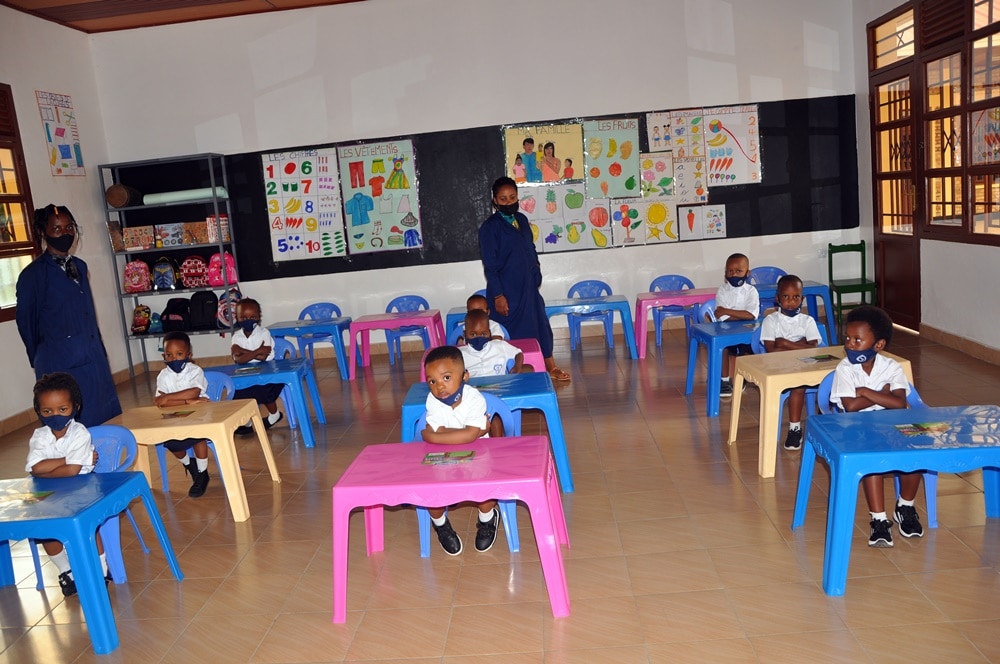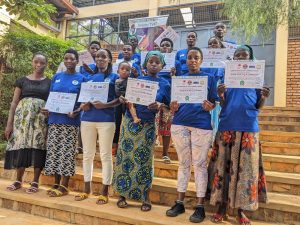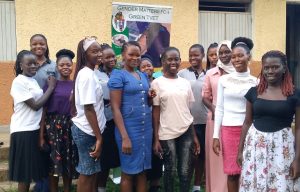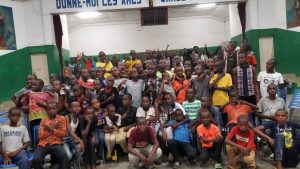Salesians shaping the way to lead by example in Child safeguarding and Protection
By DUSABEMUNGU Ange de la Victoire
At a time when child rights are being violated around the world, for the Salesians of Don Bosco in Africa of Great Lakes Province, this is the right time to reform and empower the safeguarding and protection of the children in the best possible way.
As it is well known throughout the world, the Salesian Preventive system has shown that it can help a child grow both physically and morally, in addition to acquiring Christian values.
Through Don Bosco Tech Africa, a program has been launched to train salesians and those who work with them on Child Safeguarding and Protection, with the aim of making Salesian centres or schools, the ideal environment for children.

To find out more about the Program, we spoke to Brother John Njuguna, Deputy Director of Don Bosco Tech Africa, in an interview on May 2, 2022, while he was in Kigali to train salesians and those who work with them on Child Safeguarding and Protection.
Brother John Njuguna, Salesian Brother is a member of the Salesians of Don Bosco. He was born in Kenya and for his salesian life, he worked in Uganda, in Rwanda, and currently in Kenya in the Don Bosco tech Africa office, as the Deputy Director, coordinating different programmes and one of the programs he is coordinating is this of child safeguarding and protection.
Below are excerpts of the Interview

What should we understand with the term “Child safeguarding and protection”?
The term is clear because it speaks about child safeguarding and protection. So, it goes with the issue of safeguarding the children, and protecting them from any kind of abuse. So, the rationale of why we are doing this is to emphasise the sacredness of life. That life is very sacred. It comes from God, and it needs to be protected. It needs to be safeguarded. Because we would like each and every human being to grow to what God has made that person to be and as we hear from ancient wisdom is that the glory of God is man full alive. So, we would like to make sure that the children’s will come to ourselves, they are enabled to grow in dignity to their full maturity and we believe this will give glory to God.
Why child safeguarding and protection policy important in the Salesian Institutions?
That is very important because as solesian institutions, the cardinal role that we have is to make sure that we nurture the children, the young people who come to us so that they become good Christians, and honest citizens. And if someone is to become a good Christian, and then this should be a person who is fully alive. This person who should really be given that ambience, and from what we have learned from Don Bosco is that he took this challenge, looking at the plight of the young people in his time, that was in the city of Turin, he took the plight of them and it touched him that they were not given that kind of an environment where they could grow in dignity. And him finding them into the prison during His ministry, this shock to his heart, and he looked for ways of preventing them from going to the prison.

And that’s where he started his work of preventing the young people from going to the prison and giving them an enabling environment where they could grow and be able to enjoy their life as human beings living fully in dignity. And Don Bosco has left via us with this great charism, this great heritage and we are proud to do it because we have seen from our own eyes, that young people who have been assisted, who have been nurtured, have become prominent people who are contributing to the society.
And I believe going back to the issue of giving glory to God is that through their life, that they are able to show the greatness of God, even to the others and I believe that this intervention is quite significant. Now basing on that historical background that Don Bosco has entrusted to this mission to care for the young people, and to make sure that they become good Christian and honest citizen.
When you look at the challenges facing the family today, what impact did you see on the rights of the children? Is there a way to work with parents to implement the child protection policy? Maybe you will tell me about the Child protection and safeguarding policy in the Salesian institutions in Africa.
Yeah, I would say that In Africa, we have a new form of life or we could call it the urbanisation of life. We are moving from the traditional aspect where people used to live in the villages and we are now finding that both parents are entering into the professional life where the father is working, the mother is working and this is posing a kind of a challenge based in on our historical approaches towards caring of the children because earlier enough the children were being taken care of the grannies or the mother was not working a professional job that would take her out of the Home, but now we have in business new phenomena that are coming up. And it’s posing the kind of challenge with the issue of the parenting and the children can be said to be more vulnerable within these days because of that absence of the parents on their lives.
And most of the parents also lack these kinds of know-how to do the parenting and this is also affecting the children in a way. We have also other socio-economic factors that are coming into play, whereby the need for education, need for medical treatment, need for better standards of living, and this is forcing the parents really to be out so that they can be able to meet this and this is also affecting the life the children who grow up, because without the presence of the parents, the children are already disadvantaged.

We could really try to echo that the parents should look for more time to be able to spend with their children. We could also speak on the education front where the emphasis on academic is becoming too much that the children are not given the time to be able to play, the time to be able to relax, because as they come from school, they are given hundreds of homework and they need to sit down and do that homework in the morning they need to wake up and then very early they go for the early classes in the school and they are stressed already. This is also affecting them as they grow up.
So, we would like to say that the Intervention that we are bringing up is to emphasise the different kinds of rights that these children’s have, and they need to be accorded to them. Whether it is the parents, whether it is the education, whether it is their state, or whoever is concerned, as a stakeholder within this development of the Children.

So, we want to bring all the stakeholders in place and they understand what is their role, what is their responsibility in creating an enabling environment for their children to grow in.
So, the policy will come, yes, but we have not developed it because we thought of, first, creating an awareness among the different stakeholders, especially the salesians and those working with them and then after they have understood that, why we are doing this, we are now going to involve them in developing a policy that fit their own situation. So that will come later. But the policy will be just been given the guidelines on how we can be able to make an ideal environment for the children to grow in.
With the general picture, how is a child protected and safeguarded in a Salesian institution based on the research you have done?

Yeah, we did the research in 2019, that was targeting the Salesians and those working with them and also a section of the children who are beneficiaries of this and it was surprising that the research came out that 84% of the Salesians and those working with them could not be able to detect an abused child or not be able to detect the instances that can lead to a child to been abused and this was really shocking, because if you’re speaking about only 14%, who are able to detect this, and then we found that this was an alarming situation which needed an intervention. At the same time, the research was quite positive that the preventive system has really helped it very much in order to avoid abuse to the children, especially within the solesian institutions. But we still believe that the research also showed that there were some cases of abuse within the Salesian institutions and this now necessitated us to come up with an intervention.
So, I will look at it as a very important kind of step that from that research, if it can be reviewed, it has a lot of information that we can be able to look at it we are now using that research because we found that one of the recommendations from the research that we should be able to develop a kind of a manual that will explain the aspect of child safeguarding and protection within the Salesian environment.
So, we have already developed that manual and we have also come up with a framework so that whoever wants to develop the policy and be able to refer their content of the framework, how the institutions can be able to come up with their own policy, and the two documents are available, and they are going to be shared with the participants, (who were being trained in Rwanda,) so that they can be able to start thinking on how they create that enabling environment for the children.
Do you have any specific message to the Salesian centres in these times when the strong implementation of the programmes that intend to protect children are needed?
Uh, yeah, I would say that the Salesians this is our apostolate. Let us be defenders of life. So, we are inviting all the Salesians within the province, (AGL: Rwanda, Uganda and Burundi), to be able to cooperate with a team that we are working with, first of all, to love life, because that’s what we are all to love. If we love life, then definitely we will work hard in order to protect it, you will look for ways of enriching yourself so that you can be able to protect it. So, we are inviting them to really open up and let us work together in order to see on how we can be a shining example when it comes to the protection of life.
We have our Rector major who has already told us that young person whether a boy or a girl is the sacred towards us and we should be able to look at that person as a sacred and having that concept that he/she is sacred, he is given to us by God and we are supposed to take care of this gift God has given to us and when we do that, we give glory to God.

SUBSCRIBE TO OUR NEWSLETTER




